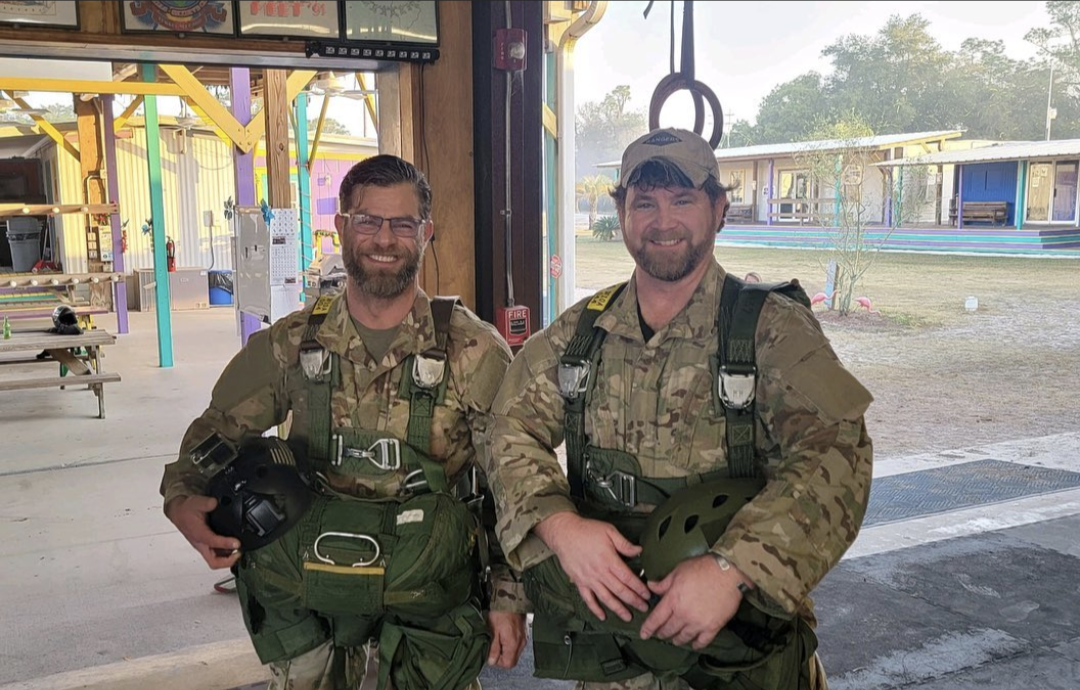ROTC Program
Skyhawk Battalion
The ROTC program at Freed-Hardeman University is a detachment of the Skyhawk Battalion based at the University of Tennessee, Martin. The majority of the Basic Course requirements will be met on FHU’s campus, with minimal need to travel to UT Martin to fulfill course requirements. This need increases during the Advanced Course of the program as a cadet is further molded into the future military leader the Army seeks. This process culminates with a cadet receiving direct instruction from the Skyhawk Battalion Commander while attending 400-level classes.
FHU’s ROTC program is generously supported by the Bill and Irene Morgan ROTC Scholarship Fund, which greatly contributes to making ROTC a reality for many future cadets.

History
Army ROTC is a program offered at hundreds of colleges and universities nationwide training college students to be officers in the active Army, Army Reserve, and Army National Guard. It is a four-year program divided into two parts: the Basic Course and the Advanced Course. The Basic Course is normally taken during the freshman and sophomore years. The Advanced Course is usually taken during the final two years of college and includes a four-week assessment course that is normally attended in the summer, between the junior and senior years. The mission of Army ROTC is to commission the future officer leadership of the U.S. Army.
Scholarships
Bill and Irene Morgan Annually Designated ROTC Scholarship
FHU’s ROTC program is generously supported by the Bill and Irene Morgan ROTC Scholarship Fund, which greatly contributes to making ROTC a reality for many future cadets. Students who meet the following criteria may be considered for the Bill and Irene Morgan Annually Designated ROTC Scholarship:
- Demonstrated financial need
- Full-Time enrollment in the FHU ROTC Program
- Maintain good academic standing
- Respectable reputation among faculty and students
Army ROTC High School Scholarship Program
The Army ROTC high school scholarship program is designed for students graduating high school. Students are awarded Army ROTC scholarships through a highly competitive, national-selection process. The selection is based on academics but also incorporates and considers athletic participation and leadership positions held.
The ROTC scholarship benefit package provides current tuition and fees or a flat rate of $10,000 for room and board per academic year. In addition to tuition and mandatory fees, a book allowance of $1,200 per year is provided.
When to Apply?
Eligibility Requirements
Scholarship criteria for selection:
- A United States citizen
- A minimum 17 years of age by October 1 of the college freshman year and younger than 23 on June 30 of that same year. (In addition, a student must not reach their 30th birthday by June 30 of the year in which they will graduate from college and receive their commission).
- Have no moral obligation or personal conviction that will prevent the student from “Supporting and defending the Constitution of the United States against all enemies, foreign and domestic,” or conscientiously arms
- Satisfactorily explain any record of arrest and/or civil conviction
- A minimum high school GPA of 2.500
- A minimum SAT score of 1000 or an ACT composite score of 19
- Agree to accept a commission in the United States Army
- Meet required physical standards
- Be a high school graduate or have an equivalent certificate before September of your college freshman year. If you are taking or have taken college courses, you must be considered a beginning freshman and have four academic years remaining for a baccalaureate degree upon enrollment in the fall of your college freshman year
Your Commitment to ROTC and the Army
Your Obligations
Your must sign a contract with the Secretary of the Army. If you are 17 years old when you enroll, your parents or guardian must also sign this contract. If you are 18 or older, only your signature is required. This contract contains a requirement to repay the United States government for all financial aid received if, after you begin your sophomore year, you fail to comply with the terms of the contract. This repayment may be monetary or in the form of enlisted service. The choice rests with the Army and not the scholarship cadet.
You must enlist in the Army Reserve for a period of eight years. You must be 17 years old by the time of enrollment in order to sign an enlistment contract.
You must enroll in the college or university listed and pursue the academic discipline identified in your selection letter.
You must attend the ROTC Advanced Camp, normally between your junior and senior years of college.
You must accept a commission as either an active Army, Army Reserve, or Army National Guard officer upon completion of the required degree and ROTC courses.
You must serve in the military for a combined period of eight years. This may be fulfilled by:
- Serving on active duty, if selected, for four years followed by service in the Army National Guard (ARNG) or United States Army Reserve (USAR) or the Inactive Ready Reserve (IRR) for the remainder of the eight-year obligation.
- Serving eight years in an ARNG or USAR Troop Program Unit, which includes a three-to-six month, active duty period for initial training.
Application
Apply online for the Army ROTC High School Scholarship.
National Guard/Army Reserve
Students may take advantage of a program that allows participation in ROTC and simultaneous enlistment in the Army National Guard or Army Reserve, provided a vacancy exists in either a Guard or Reserve Unit. This is referred to as the Simultaneous Membership Program (SMP), and it provides the student an opportunity to gain valuable experience and generate income while still enrolled in college. Students participate in training with their USAR or ARNG unit one weekend per month, while earning their commission through ROTC. Upon college graduation, students will be commissioned as an officer in the Army and have the option of either serving full-time on Active Duty or part-time in the Army Reserves or Army National Guard.
Requirements
Already Serving in the United States Army Reserve or Army National Guard
If you are already serving or enlisted in the United States Army Reserve or Army National Guard, enrolling in an ROTC program increases your benefits (see below). If you are (or will be) a freshman and are currently enlisted, you are eligible for SMP at the beginning of your sophomore year. During your first year, you can still enroll in ROTC classes, and drill with your unit, but you are not formally in the SMP. If you are a sophomore or higher and currently enlisted, you must enroll in the SMP to enroll in ROTC.
Not Enlisted with the United States Army Reserve or Army National Guard
In order to enter a SMP, students with no prior military service must attend Basic Combat Training (BCT) and Advanced Individual Training (AIT) during the summer and will be assigned to a local National Guard or Reserve Unit upon completion of training.
- It is possible to join the ARNG and enroll in ROTC without going to Basic Training; but without Basic Training and AIT you are only eligible for a fraction of the tuition benefits available
- In most cases, completing BCT and AIT will take longer than the summer break and cause you to skip a semester or a half semester of classes. However, many students see this as a good bargain for the amount of financial aid for which they are eligible.
Benefits
Students involved in a SMP agreement can take advantage of the following benefits:
- Up to 100% tuition and fees paid
- Cash enlistment bonus, depending on MOS
- $300 – $500 monthly ROTC stipend
- $274.84 monthly drill pay (SGT (E-5) rate)
- $309/month GI Bill (requires completion of BCT and AIT)
- $350/month GI Bill Kicker (requires completion of BCT and AIT)
- Basic soldier skills (BCT) and job skills (AIT)
- Hands-on military experience by participating in your unit training
Students already enlisted in the Army Reserves or Army National Guard who join an ROTC program will also be granted non-deployable status, ensuring that their college education will not be interrupted, and will receive officer training within their unit.
Obligations After Graduation
When you enlist in the USAR or ARNG, you may choose an enlistment period of up to six years. However, as soon as you graduate from college and are commissioned through ROTC (usually on the same day as graduation), your enlistment contract is terminated—no matter how much time is left on your enlistment.
Upon commissioning, you start a brand new career as an Army officer. This means that even though you were enlisted in the USAR or ARNG while going to school, you have the option of serving as an officer either full-time on Active Duty or staying part-time as an officer in the USAR or ARNG.
Also, the job specialty (MOS) you had while enlisted has no bearing on your career options as an officer. If you like the field you were in as an enlisted soldier, you can choose that field as an officer. If not, you can pick any of the other 16 basic branches.
SMP does not lock you into or out of any commissioning options. You can still go on Active Duty, or switch from having been enlisted in the USAR to an officer in the ARNG (or vice versa). You can stay in your enlisted career field or switch to something totally different.
More information on the SMP scholarships can be found online.
Green to Gold Scholarships
Scholarships are awarded for two, three, or four years. Soldiers with two years of college remaining to complete their degree are considered for two-year scholarships. Soldiers with three-years of college remaining to complete their degree are considered for three-year scholarships. Soldiers without college credit who require four years to complete their degree are considered for four-year scholarships.
Requirements
The following are the scholarship requirements:
- A United States citizen (non-waiverable)
- Age- applicants must be under 31 years of age on December 31 of the year you complete all requirements for a commission. You must have acquired your bachelor’s degree by this time. This is a statutory requirement, and there are no waivers authorized
- No criminal convictions
- You must have served a minimum of two-years Active Duty as well as three months of Active Duty for every one month of specialized training (a waiver can be requested)
- GT score of 110 or greater
- Pass the APFT within the last six months with a score of 180 or higher; a minimum of 60 points in each event
- High school graduate or equivalent
- Cumulative high school or college GPA of 2.5
- Letter of acceptance to school of choice offering Army ROTC
- Letter of acceptance from the PMS of that Army ROTC battalion
- Favorable National Agency Check
- DODMERB Medical Qualification
- No more than three dependents including spouse (waiverable)
- Four-year applicants must have a minimum ACT score of 19 or a minimum SAT score of 1000 (waiverable)
Benefits
Green-to-Gold Scholarship Recipients receive:
- Tuition or room and board support
- Additional money for textbooks, supplies, and equipment
- A monthly stipend for up to 10 months each school year that increases each year based on your Military Science Class
- Pay for attending the Cadet Leadership Course (CLC) (formally Leader Development & Assessment Course LDAC) between the junior and senior years of college
- If qualified, Montgomery GI Bill/Army College Fund (MGIB/ACF) benefits
More information about the scholarship and the application can be found online.

